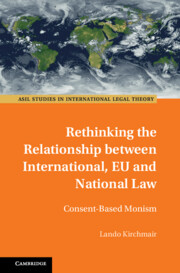Book contents
- Rethinking the Relationship between International, EU and National Law
- ASIL Studies in International Legal Theory
- Rethinking the Relationship between International, EU and National Law
- Copyright page
- Contents
- Figures and Tables
- Preface
- Acknowledgments
- Table of Cases
- Abbreviations
- Introduction
- Part I Common Theories on the Relationship of Legal Orders and Their Flaws Concerning the EU Legal Order
- Part II Consent-Based Monism
- Part III A Practical Application of Consent-Based Monism
- Conclusion
- Bibliography
- Index
Conclusion
Published online by Cambridge University Press: 29 February 2024
- Rethinking the Relationship between International, EU and National Law
- ASIL Studies in International Legal Theory
- Rethinking the Relationship between International, EU and National Law
- Copyright page
- Contents
- Figures and Tables
- Preface
- Acknowledgments
- Table of Cases
- Abbreviations
- Introduction
- Part I Common Theories on the Relationship of Legal Orders and Their Flaws Concerning the EU Legal Order
- Part II Consent-Based Monism
- Part III A Practical Application of Consent-Based Monism
- Conclusion
- Bibliography
- Index
Summary
In this book I have argued that consent-based monism provides a theoretical foundation for finding a decisive source in a norm conflict situation. It is, however, important to emphasize that I do not intend to offer an absolute and invariable solution which fits any norm conflict arising between overlapping international, EU and national legal orders. In short, consent-based monism aims to give consideration to the complex and divergent structures of international, EU and national law. Consequently, it is important not to limit the scope of the theoretical background of the relationship between international and EU or domestic law by pressing international, EU and national law into the straitjacket of a certain, predetermined legal consequence. The relationship between international, EU and national law does not follow a uniform (political) order – for example, one legal order – yet, nowadays, international, EU and national law are not completely alien to each other.1 This is in sharp contrast to old theories such as dualism and Kelsenian monism, which are considered to be incapable of coping with the major developments in international, EU and national legal orders since the inception of these grand but old theories. This important difference sets consent-based monism apart from still prevailing theories such as Kelsenian monism and dualism. While the predominant stream of global legal pluralism is also restricted when answering the question behind this book as it does not offer a satisfactory normative account, global constitutionalism suffers from major shortcomings too. Global constitutionalism presumes too many substantial values for the envisaged common normative denominator to be a helpful concept for the relationship between international, EU and national law. While global constitutionalism cannot carry the “burden of universality,” with constitutional pluralism we are likely to end up in a “constitutional stalemate.” In contrast to global legal pluralism, which was said to provide for a descriptively but not prescriptively satisfying account, consent-based monism offers a theoretical explanation of the structural relationship between international, EU and national law.
- Type
- Chapter
- Information
- Rethinking the Relationship between International, EU and National LawConsent-Based Monism, pp. 323 - 326Publisher: Cambridge University PressPrint publication year: 2024

